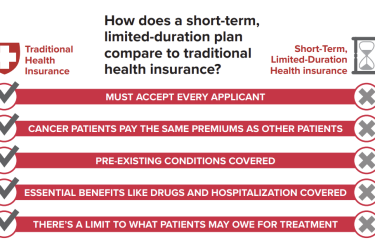 A federal judge in Texas has thrown out the Affordable Care Act – every single word of the sprawling law. As Michigan law professor Nick Bagley tweeted, even the calorie counts on restaurant menus are now at risk.
A federal judge in Texas has thrown out the Affordable Care Act – every single word of the sprawling law. As Michigan law professor Nick Bagley tweeted, even the calorie counts on restaurant menus are now at risk.
The Dec. 14 Texas decision, if upheld (a big if) threatens the coverage of roughly 20 million people covered in the ACA exchanges and through Medicaid expansion. (More on the numbers at the end of this post).
It affects tens of millions of other Americans either in the individual market (outside the exchanges) or who get insurance through an employer. Much has been said about the protections for people with pre-existing conditions. But that’s by no means all that’s at stake. There are many provisions that are very popular that people don’t necessarily think of as “Obamacare” – covering adult children until age 26, the ban on annual and lifetime insurance limits, the cap on how much more older people pay for insurance than younger ones, free preventive care service, etc. Some Medicare patients would face higher drug costs. And CMMI – the Medicare and Medicaid Innovation Center and all the work it’s doing on health care delivery – was also created by the ACA and is thus subject to extinction. And on and on.
Right now, nothing changes. The court ruled that without the individual mandate penalty – eliminated by Congress in last year’s tax law – the law cannot stand. But the judge didn’t issue an injunction. Unless the Trump administration steps in to immediately stop the ACA, nothing happens while this wends its way through the courts. The White House issued a statement on the night of the Texas decision:
“We expect this ruling will be appealed to the Supreme Court. Pending the appeal process, the law remains in place.”
Of course, there is no guarantee that President Donald Trump won’t change his mind. But the chaos would be considerable, and the political risk great (given that we already seem to be well into the 2020 campaign cycle and the Democrats just won the House in no small part because of voter concern about protecting people with pre-existing conditions). CMS Administrator Seema Verma has hinted about a “backup” plan but nothing has been made public. And since most observers expected a far narrower ruling, affecting patient protections but not the entire law, any “backup” might have been a far narrower fix for that more limited scenario.
So for now, premium subsidies will still be made. Protections for pre-existing conditions continue. Medicaid expansion doesn’t stop (although the uncertainty may affect the states that are just now considering expansion, either because they had a referendum in November approving it or they’ve elected Democratic governors as in Wisconsin, Maine and Kansas). Doctors and hospitals will get paid.
But the uncertainty for both consumers and politics is not insignificant. This thrusts the ACA right back onto center stage in both Congress and the courts. People will be confused – we may never know how many people didn’t sign up for coverage on the last day of open enrollment, which was the day after the court ruling, because they didn’t think they still could. Democrats will be in the majority in the House and they can easily pass some ACA repair plans – but the Republican-led Senate will remain an obstacle.
So it’s up to the courts. California and the other liberal states that had challenged the Texas case, itself brought by 20 more conservative states, have already said they will appeal. The conventional wisdom is that it will end up in the Supreme Court, and that will probably take until 2020. Two very prominent health law experts, Nick Bagley (pro-ACA) and Jonathan Adler (anti-ACA), have both (on Twitter) made the somewhat contrarian case that the legal argument the Texas judge made is so absurd that the Fifth Circuit (a very conservative court with five Trump appointees) will put it quickly out of its misery and it will never get to the Supreme Court. Time will tell.
There’s been a ton of good reporting and analysis on this (more remarkable since the ruling popped on a Friday night when half of Washington seemed to be at holiday parties). But if you are going to read just one analyses, I’d recommend this NYT op-ed from Adler and Abbe Gluck.
NOTE: A word on how many people would lose their coverage if the law were thrown out (without other legislation put in place). Estimates vary. I’ve seen some news reports citing the 17 million people losing insurance estimate from the Urban Institute (but that’s not how many are covered under ACA exchanges or Medicaid expansion – it’s Urban’s estimate of how many of those who are covered would not be insured, it assumes some of them would get insurance on the individual market post-exchange). A Kaiser Family Foundation report estimated about 15 million were covered by Medicaid expansion –12 million of whom were newly eligible. Plus there were about 10 million people covered in the exchanges last year – though that looks like it’s dropping this year. And some could get insurance off exchange…On the other hand, some states are poised to expand Medicaid in 2019, boosting the number directly affected. Plus there’s the under 26 population – it’s hard to know how many of them would lose coverage…. And people who would have trouble getting covered in the individual market because of pre-existing conditions… A CBO estimate in 2017 found that repeal of most – not all, but most – of the law would lead to 32 million people being uninsured in a decade.







